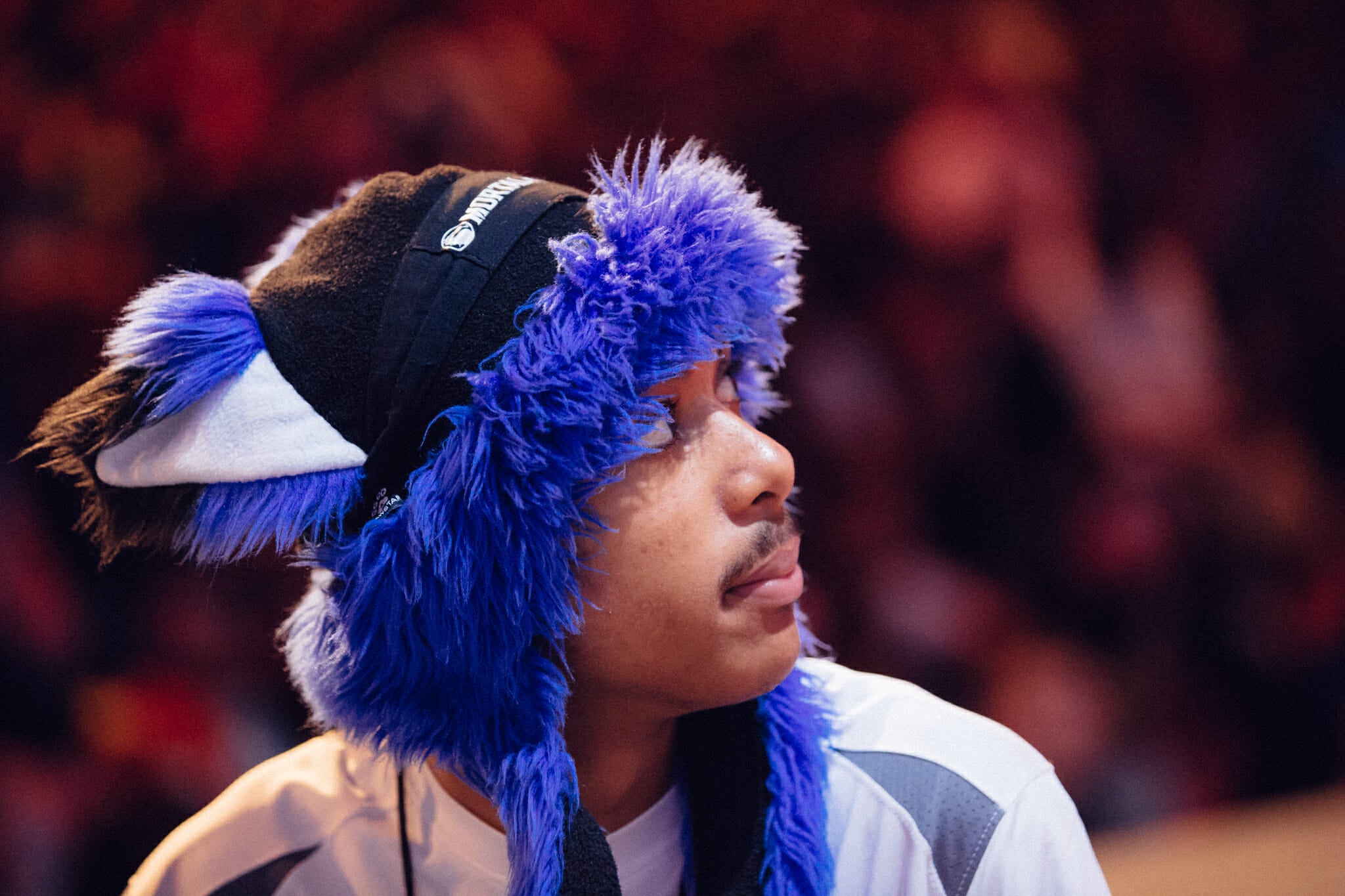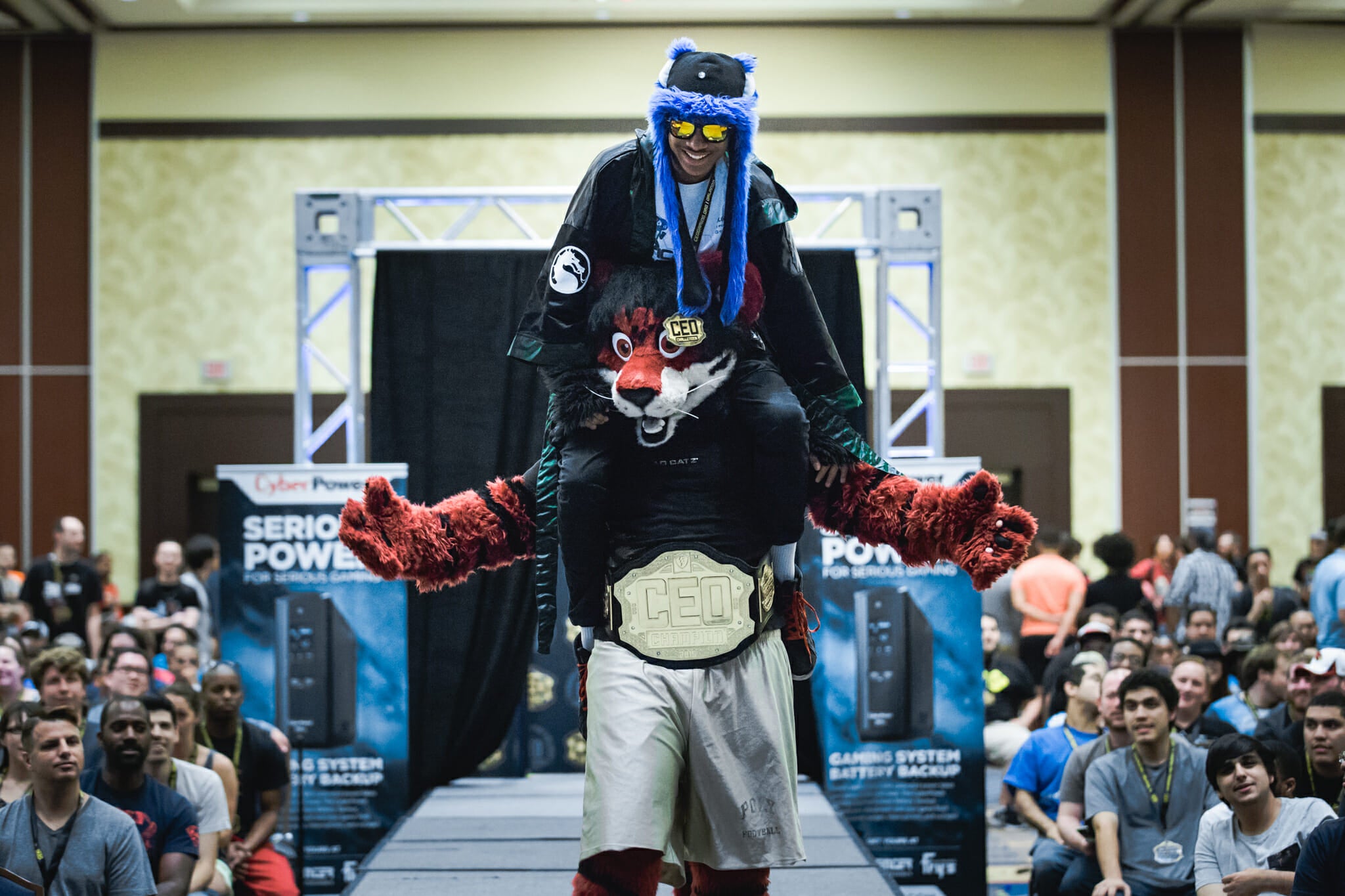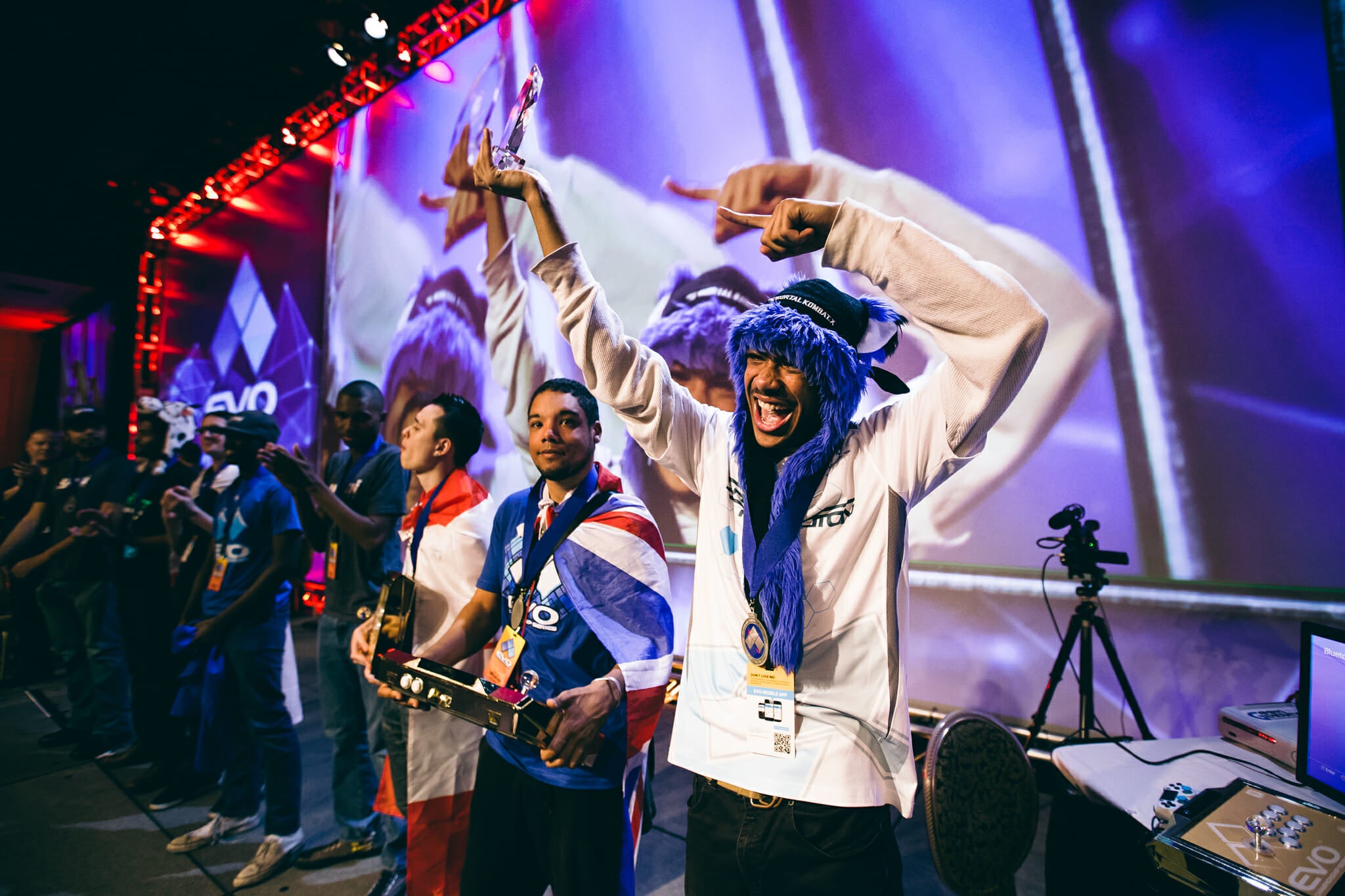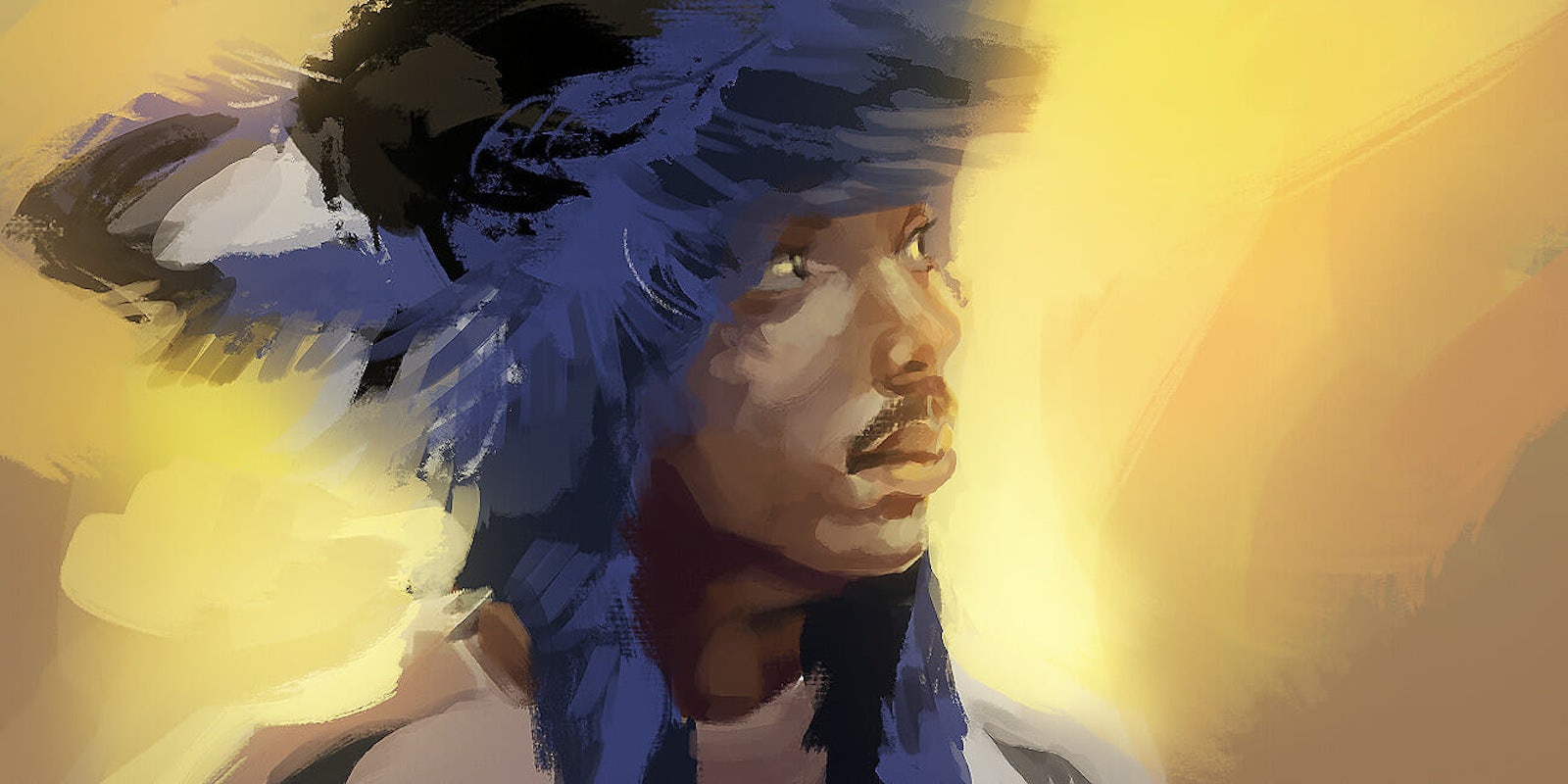The first time Dominique “Sonic Fox” McLean picked up the controller at a Mortal Kombat tournament, he was 13 years old. Like most competitive fighting-game tournaments, the Philadelphia-based event was open to anyone who wanted to sign up, even a precocious youngster from Delaware.
It was 2012, and the competition version was the ninth iteration of the game, which was rated “M” for mature—meaning it was intended to be played exclusively by adults. McLean’s opponent, who was more than twice his age, leaned over and asked, “Why are you even allowed to play a rated-M game?”
McLean didn’t miss a beat: “Why are you losing to me at a rated-M game?”
Today, McLean is 17, barely at the recommended age for playing Mortal Kombat, and in the years since his first tournament—where he placed ninth—McLean has become, arguably, the single most-dominant player in the world of competitive fighting games.
Over the past year alone, McLean has won at least a dozen tournaments in three different fighting games, including the first-ever organized league season for Mortal Kombat X, the newest release of the long-running, genre-defining series. He hasn’t walked away from a single tournament without a first-place trophy in hand in a year and a half. In a single two-week period, he handily won the two biggest prizes in the world of Mortal Kombat, raking in over $100,000 in prize money. “That’s enough to pay for all of my college and still get a car,” he said with a laugh.

McLean grew up in a gaming family. One of his earliest memories is, at the age of 3, beating up on his brothers in Tekken 3. (His older brother Kristian is a successful professional gamer in his own right.)
In a single two-week period, McLean handily won over $100,000 in prize money.
For someone who spends hours every day virtually beating his opponents into bloody, pixelated pulps, McLean is surprisingly positively bubbly.
“One of Sonic Fox’s assets is his personality. He’s very carefree,” said Carl “PerfectLegend” White, a 27-year-old, four-time fighting-game world champion whose bouts with McLean have been major events. “He’s still a kid, he’s 17. … He has a lot of fun playing, even when he loses. He hasn’t lost really hard or a whole lot yet to make him salty, but he doesn’t take losses too hard.”
“I could lose, go last place in a tournament, and in about 10 minutes, I could be acting like nothing ever happened,” McLean concurred. “I never let it get me down. I just think about what I did wrong and what I can change for next time. Obviously, I’ll be sad for the first few minutes, but at the end of the day, we all just came out to have fun at a gaming event. And, even if I lost, I did have fun.”
White says he seen that disposition reap direct benefits for McLean. “He’s been able to coming back from losing early on and win tournaments,” he recalled.
His effervescent demeanor is matched by his trademark tournament garb. He’s a self-professed furry—a term used to describe people who are part of a community of fans of anthropomorphic fictional characters. The name “Sonic Fox” comes from the first furry character he created for himself, and his neon blue fox hat has become a major part of his identity. Nevertheless, his reputation as a master of the game can be intimidating. (In contrast to other esports, where teams often compete online or stationed on opposite sides of a convention hall, players sit right next to each other in fighting-game tournaments.)

“It was intimidating to people to see a kid who is only 13 years old and he’s about to sit down and destroy them,” McLean recalled with a chuckle. “Even today, I still intimidate people. I sometimes see them physically shaking when I sit down next to them. … What that means in a fighting game is that it’s over from there—they’re just going to lose. I’ve gotten into their head and I know everything they’re about to do before they do it.”
Much of McLean’s talent is natural. When friends convinced him to enter his first tournament as a tween, he was still raw. That was good enough to get him in the top echelon of players, but what’s made him the best is his rigorous study of how the game works.
For someone who spends hours every day virtually beating his opponents into bloody, pixelated pulps, McLean is surprisingly positively bubbly.
There’s a good chance you’ve played Mortal Kombat at some point in your life. However, your button-mashing likely bears little resemblance to the game McLean plays. Rather—imagine chess carried out at a breakneck pace, where each player can make as many moves as they want without waiting for their opponent to respond. On top of that, imagine that the rules for how each piece moved changed every few months. Instead of a knight moving two up and one over, it would move two up and two over.
Since games are constantly patched by the developers, players like McLean also have to constantly relearn the rules of the game. They dive deep into the structure of each character’s moves, frame-by-frame, to understand the strengths and weaknesses of every punch, kick, and fireball, down to the millisecond level. The perpetual reinvention creates a constant arms race. When McLean discovers something new and uses it to his advantage in a tournament, all his opponents immediately take notice and adjust their own strategies accordingly.
That perseverance and obsessive level of study is what makes Sonic Fox a champion. In a video interview with the Daily Dot earlier this year, there’s a moment where McLean turns his head to the side mid-sentence. He’s still talking, giving his thoughts on how a recent patch affected gameplay, possibly mentally altering his process for character selection. But his head has tilted just ever so slightly to the right. His responses to questions from host Efren Salinas flow in eight directions at once, as if he’s working out his opinions on the patch’s changes to the behaviors of Sub-Zero or Erron Black as he’s talking. There’s no break or slowdown in the conversation, but Salinas notices something slightly off.
“Are you playing Mortal Kombat live as we interview you?” asked Salinas.
“Yes and no,” McLean answered sheepishly. “I had to test something really quick as it was on my mind.”
Imagine chess carried out at a breakneck pace, where each player can make as many moves as they want without waiting for their opponent to respond.
While McLean is most known for Mortal Kombat, he also competes in a whole host of other fighting games. Though he’ll rhapsodize about the joys of the 2D fighting game Skullgirls, in which he’s currently ranked as the world’s second-best player, McLean’s a serious threat in pretty much any game he picks up.
“Very few players can win the EVO world championship twice. Even fewer have won it back-to-back. Sonic Fox won Injustice: Gods Among Us in 2014 and Mortal Kombat X in 2015. Two different games in back-to-back years,” said Steve Brownback, a former pro player and quality assurance analyst at NetherRealm Studios, the company responsible for the Mortal Kombat franchise. “This kind of long-term dominance and multiple-game versatility is almost unprecedented in the fighting-game community.”
Ryan Neal, a U.K.-based gaming commentator who goes by the handle Ketchup, sees McLean as a transformational figure within the fighting-game community. “Sonic Fox is a really special case with esports. He takes the stereotype of games being bad for youth and turns it on its head,” King insisted. “He’s up for playing anybody who wants to learn or get better, be it online or offline. Many people can learn from his style of play, and many more can simply be inspired by how someone so young is able to compete with guys and girls who have played for 20 years [or] more.”

It also helps that, as White argues, there’s been a recent shift in how many fighting games are designed to favor the style of play at which McLean excels. “A lot of the games used to be slower-paced and more based on space control,” he explained, noting a tendency among newer games to reward not only faster play, but also players who know how to link a single hit into round-ending combos. “Sonic Fox likes to play really fast and control the tempo. His style comes from the anime-style games where you make one right move and the match is over.”
“I think one of the things that really stands out about Sonic is his creativity,” added Tyler Lansdown, a community specialist at NetherRealm. “It seems like [in] every match, he does something new that I’ve never seen before.”
McLean’s position as a potential breakout esports star is bolstered by how his own life story parallels the diversity blooming in the world of competitive video gaming. While the professional competition in other esports—the catchall term for competitive gaming—like League of Legendsand DOTA 2, skews heavily white and Asian, the fighting-game community is significantly more diverse. McLean is black, openly bisexual, and as previously noted, a furry. Within the world of fighting games, he’s never felt anything other than completely and wholeheartedly embraced.
“The fighting-game community looks at itself as a family. Each game has a completely different community, but almost all of those communities are completely accepting of everyone’s race, gender, color, sexuality, all of that,” he said. “Whenever someone starts saying something about someone’s sexuality or race or any of that stuff, we typically are quick to step in on them.”
Despite being one of the biggest stars in esports, McLean largely keeps his gaming exploits separate from his life at school. His close friends and teachers know about his competitive jet-setting, but most of his classmates are unaware.
“A few kids at school have watched me play online and then freaked out when they recognized me in the halls,” he recalled. “When they realized who I was, they were like, ‘Oh my god, are you Sonic Fox?”
More than a little embarrassed, McLean just shielded his face and kept on walking. That tactic may have worked in his school’s hallways then, but he may have to figure out a better strategy soon. If McLean keeps winning at this pace, and esports continues its march towards mainstream acceptance, he’s going to become a household name.
Illustration by Tiffany Pai | All photos by Robert Paul
